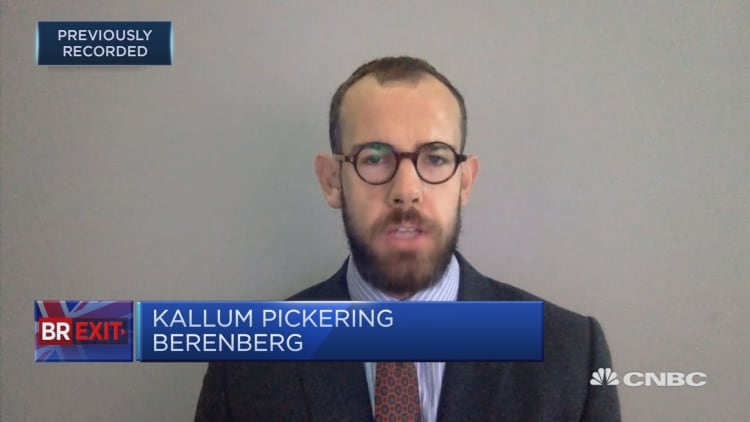LONDON — The U.K. and EU have their poker faces on as post-Brexit trade talks hit a fresh impasse, with both sides arguing their opponent needs to make new concessions.
The blame game is not new for those following the Brexit process, but it has resurfaced at a critical time for the future relationship of the European Union and the U.K., which voted to leave the bloc in 2016.
A trade agreement is needed before the end of the year — without a deal in place by January, U.K. and EU businesses will default to World Trade Organization rules, and face higher costs and barriers to trade.
Government minister Michael Gove told Sky News on Sunday that there was a less-than-50% chance of a deal being reached. Earlier this month, he had assigned it a 66% probability.
In order to still ratify a deal before the end of the year, the political compromises would probably have to be struck within the next three weeks.Berenberg
"Let's see if the EU appreciates the importance of reaching a deal and the importance of moving ground," Gove said, adding that the ball was in Europe's court.
His comments followed a statement from the EU on Thursday calling on the U.K. "to make the necessary moves to make an agreement possible."
The U.K. and EU chief negotiators, David Frost and Michel Barnier, will speak on Monday about what sort of "structure" their talks should take, an EU spokesperson said.
"With just 11 weeks to go until the end of the transition period, time is running out. In order to still ratify a deal before the end of the year, the political compromises would probably have to be struck within the next three weeks," Berenberg said in a note on Monday morning, assigning a 30% probability a EU–U.K. deal.
Prepare for a no-deal
The blame game has coincided with new comments from U.K. Prime Minister Boris Johnson, who advised British businesses to prepare for a no deal.
"I have concluded that we should get ready for January 1 with arrangements that are more like Australia's, based on simple principles of global free trade," Johnson said on Friday.
His comments indicate that businesses need to prepare for no trade agreement with the EU, as trade between the bloc and Australia takes place under WTO rules.
A group of more than 70 British businesses called on politicians "on both sides to find a route through."
"The clarity that comes with an ambitious deal will have an instant impact on firms' efforts to prepare. It will help investment by removing the threat of tariffs and quotas. And it will catalyse confidence through enhanced customs cooperation while making a precious data agreement possible, vital for services industries which make up 80% of the U.K. economy," they said in a statement on Sunday.
Trade talks have been stalled for months over three main issues: fisheries, competition rules and governance of their future agreement.
In addition, negotiations took a hit last month when the U.K. decided to override previously-agreed legislation with the EU. Europe has said on a number of occasions that it will not sign any trade deal if this remains the case.
"Despite the noise, and it is loud, the fundamentals have not changed for both sides: the second coronavirus wave makes a trade deal even more necessary for the U.K. and EU to avoid a double economic blow for business," research firm Eurasia Group said in a note on Friday.
"Johnson also needs a deal for political reasons given his mounting problems over coronavirus."



